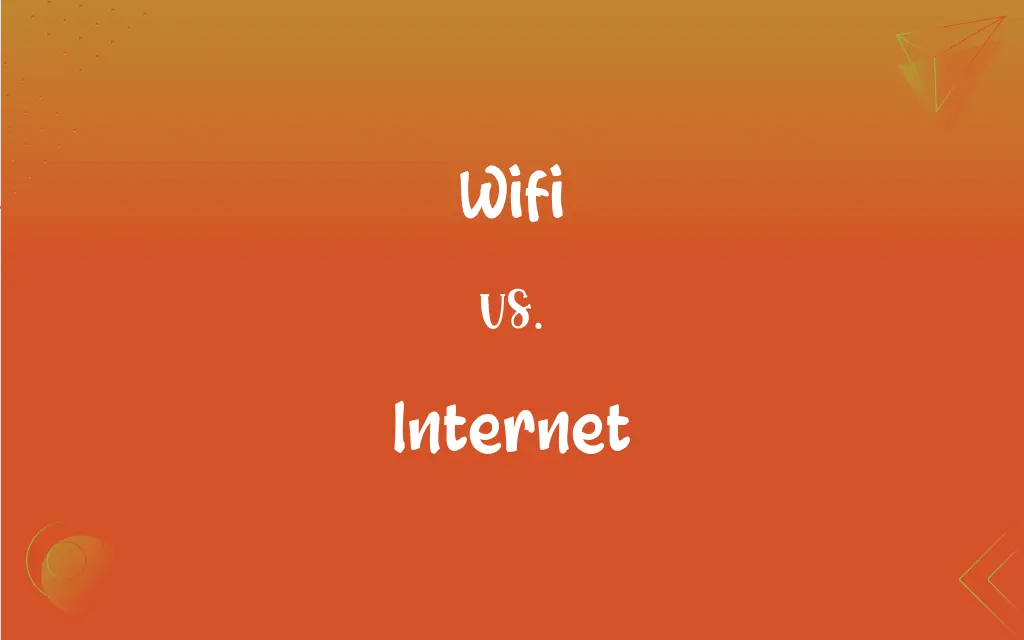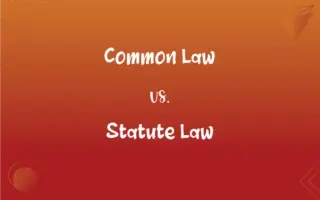WiFi vs. Internet: What's the Difference?
Edited by Aimie Carlson || By Harlon Moss || Updated on June 1, 2024
WiFi is a technology that allows devices to connect to a network wirelessly, while the internet is a global network that provides various information and communication facilities.

Key Differences
WiFi refers to a technology that enables electronic devices to connect to a wireless LAN (WLAN) network. Essential for mobile computing, WiFi allows smartphones, computers, and various devices to engage with the internet or connect to networks without physical cables. The internet, on the other hand, is an extensive global network that connects computer systems across the world. It provides a vast array of information and facilitates various forms of communication, including email, video conferencing, and data transfer.
WiFi technology leverages radio frequencies to provide network connectivity. Various standards of WiFi, such as 802.11ac and 802.11b, offer different capabilities, including diverse speed and range, catering to specific device and network requirements.
Internet accessibility is fundamental to many technologies and services we utilize today. It enables the functioning of the World Wide Web (websites and web applications), email communications, file sharing, and streaming services, among numerous other functionalities.
Despite being a crucial component for internet connectivity, WiFi alone is not the internet but a means to access it. WiFi can also be utilized for creating local networks without internet access, enabling devices to communicate with each other directly.
Importantly, the internet can be accessed through various means, not limited to WiFi. Wired connections (like Ethernet), cellular networks, and even satellite connections can provide internet access, showcasing its versatility in connectivity options.
ADVERTISEMENT
Comparison Chart
Definition
Wireless technology for local connectivity
Global network of interconnected devices
Scope
Limited to local areas (homes, offices)
Global, spanning continents and countries
Function
Connects devices to a local network wirelessly
Enables worldwide communication and data exchange
Dependency
Needs an ISP to connect to the Internet
Operates through various infrastructures
Technology
Uses radio waves
Uses various technologies (cables, satellites)
ADVERTISEMENT
Usage
Local wireless access to the Internet
Access to online services and websites
WiFi and Internet Definitions
Wifi
WiFi allows devices to connect to a network without physical cables.
My smartphone automatically connects to the WiFi when I get home.
Internet
The internet can be accessed through different connectivity methods, like Ethernet or cellular networks.
During the power outage, she used her mobile data to access the internet.
Wifi
WiFi can facilitate local networks for device communication.
We set up a WiFi network for file sharing during the workshop.
Internet
Internet services enable activities like streaming, gaming, and online shopping.
The internet connection needs to be stable to avoid disruptions during the live stream.
Wifi
WiFi networks can be open or secured with password protection.
Always use a strong password to secure your WiFi network against unauthorized access.
Internet
The internet is a vast, global network connecting numerous computing devices.
The internet has made information from around the world accessible at our fingertips.
Wifi
WiFi can operate on different frequency bands, typically 2.4 GHz and 5 GHz.
The dual-band WiFi router provides options to connect to either 2.4 GHz or 5 GHz bands.
Internet
Internet enables access to websites via the World Wide Web (WWW).
She browsed the internet to find a suitable recipe for dinner.
Wifi
Different WiFi standards offer diverse speed and range capabilities.
The new router supports the latest WiFi standard, providing faster speeds and a more stable connection.
Internet
Through the internet, various forms of communications, like emails, are facilitated.
He sent the document via the internet using his email account.
Wifi
Alternative form of Wi-Fi
Internet
A publicly accessible system of networks that connects computers around the world via the TCP/IP protocol.
Wifi
Alternative form of Wi-Fi
Internet
Alternative case form of Internet
Wifi
A local area network that uses high frequency radio signals to transmit and receive data over distances of a few hundred feet; uses ethernet protocol
FAQs
What does the internet refer to?
The internet is a vast global network that connects computer systems worldwide.
How does WiFi allow devices to connect without cables?
WiFi uses radio frequency bands to transmit data between devices and a network without physical cables.
What is the World Wide Web in relation to the internet?
The World Wide Web is a system of interlinked documents accessed via the internet using web browsers.
Can WiFi work without the internet?
Yes, WiFi can be used to create a local network without an internet connection.
How does the internet facilitate communication globally?
The internet allows global communication through various means like emails, video calls, and social media platforms.
Can WiFi networks host guest users?
Yes, many WiFi networks allow guest access, often through a separate network name to ensure main network security.
What factors affect WiFi signal quality?
Factors like physical obstructions, other electronic devices, and distance from the router can affect WiFi signal quality.
Is it possible to have a private internet network?
While the internet is inherently public, virtual private networks (VPNs) can create a private browsing experience by masking user information.
What is a WiFi hotspot?
A WiFi hotspot is a physical location where people can access the internet, typically using Wi-Fi, via a wireless local area network (WLAN) with a router connected to an internet service provider.
Can WiFi connections be secured?
Yes, WiFi connections can be secured using various encryption methods and password protection.
Can the internet be accessed without a service provider?
Typically, no – internet access generally requires a subscription to a service provided by an internet service provider (ISP).
How far can WiFi signals reach?
WiFi signals typically reach up to 150 feet indoors and up to 300 feet outdoors, depending on the router and environmental factors.
Is it possible to connect multiple devices to a single WiFi network?
Yes, multiple devices can connect to a single WiFi network, though the quality of connection may be affected as more devices connect.
Are there limitations to the content accessible on the internet?
While the internet hosts a vast array of content, accessibility can be limited by geographical restrictions, censorship, or paywalls.
Can the internet facilitate remote work and learning?
Absolutely, the internet enables remote work and learning through various platforms that support video conferencing, file sharing, and online collaboration.
What is WiFi?
WiFi is a technology that enables devices to connect to a network wirelessly.
How can WiFi speeds be improved?
WiFi speeds can be improved by using a high-quality router, optimizing its placement, using the right frequency band, and reducing interference.
Is the internet susceptible to outages?
Yes, internet services can face outages due to technical issues, cyber-attacks, or infrastructure damages.
How can one ensure safe browsing on the internet?
Safe internet browsing can be ensured by using updated browsers, enabling firewalls, utilizing antivirus software, and being mindful of phishing scams.
Is internet access only possible through WiFi?
No, the internet can be accessed via various means, including Ethernet, cellular data, and satellite connections.
About Author
Written by
Harlon MossHarlon is a seasoned quality moderator and accomplished content writer for Difference Wiki. An alumnus of the prestigious University of California, he earned his degree in Computer Science. Leveraging his academic background, Harlon brings a meticulous and informed perspective to his work, ensuring content accuracy and excellence.
Edited by
Aimie CarlsonAimie Carlson, holding a master's degree in English literature, is a fervent English language enthusiast. She lends her writing talents to Difference Wiki, a prominent website that specializes in comparisons, offering readers insightful analyses that both captivate and inform.































































